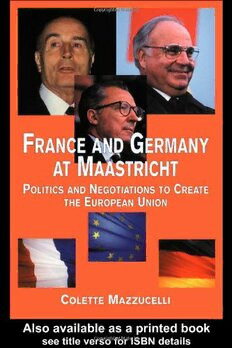
France and Germany at Maastricht: Politics and Negotiations to Create the European Union PDF
376 Pages·1999·1.362 MB·English
Most books are stored in the elastic cloud where traffic is expensive. For this reason, we have a limit on daily download.
Preview France and Germany at Maastricht: Politics and Negotiations to Create the European Union
Description:
"France and Germany at Maastricht is simply political science at its best. Its analytical narrative of Franco-German negotiations on political and monetary union is the most thorough and balanced account of the pivotal episode in the current project of European unity. It combines a comprehensive understanding of the national and sectoral interests at stake in the Maastricht negotiations with a firm grasp of the institutional and electoral environment in which negotiations proceeded. The depth and breadth of the research material required by a study of this variety alone is impressive, but Mazzucelli's lucid explanation of its meaning makes the book a valuable addition to the fields of European studies, comparative politics and international relations." -Carl C. Hodge, Okanagan University College "In the present context of the efforts to promote a European Union and Franco-German relations, Dr. Mazzucelli's book constitutes an extraordinarily useful contribution to the statesman's, diplomat's, scholar's and layman's reflections on these matters and provides extremely useful leads to all those who, in one way or another, are responsible for the destiny of the European continent and its relations with other parts of the world, in particular its transatlantic allies." -His Excellency Alfred Cahen, Secretary General, Atlantic Treaty Association "This very informative and balanced volume, rich in factual content and documentary materials, is recommended to politicians, diplomats, experts in European Union affairs and those who would like insight into "corridor diplomacy" during the Maastricht process. This book is also suggested to those who feel responsible for the success of Hungary's negotiations with the European institutions." -Hungarian Foreign Affairs Journal, Spring `97 "Mazzucelli provides an extremely detailed analysis of the national decision-making processes of two of the principal players in the Maastricht negotiations, and a comprehensive discussion of the national, subnational and transnational actors central to the negotiating process...The book's focus and methodological sophistication make it most useful for specialists in the field." -Choice, September `97 "The story Mazzucelli narrates is a fascinating one. The reader is taken inside negotiations in cabinets, ministerial offices and presidential palaces; in national parliaments, government conclaves, Commission meetings, and Council deliberations. We are given a detailed picture of the relationships developed at every level of the bureaucracy and between regional, national and Brussels bureaucracies. This is one of the best documented accounts I have seen of the manifold intricacies of EU politics and negotiation. Mazzucelli has an impressive command of both the primary and secondary materials in French, German, Italian and English. She is also a skilled and assiduous interviewer and has woven into her narrative information obtained over a period of several years. The book is impeccably footnoted and the 33-page bibliography is a mine of information. It is a pleasure to read a book produced with such care." -Glenda G. Rosenthal, Columbia University ECSA Review, Fall `97"The originality of this work, over and above the attentive look at French and German behavior during this IGC, is that it analyzes the negotiation - which was so difficult for several Member States at domestic level - combining three approaches: "Jean Monnet's practical and purposeful way of doing things," Putnam's "two-level games" (this approach...seems particularly useful in the case of Maastricht, given its emphasis on both "internal bargaining at the domestic level and external negotiations at the international level") and the "four images" of civil servants described by Aberbach, Putnam and Rockman...Anyone involved in another European Union IGC should be very interested in this analysis..." -"Europe" Bulletin, "European Library," Brussels, 15 & 16 December `97"Mazzucelli's book sheds light on the history of Franco-German governmental relations as the Cold War ended..., situates Franco-German bilateralism within a process of multilateral negotiations in the European Union..., and empirically confirms that it is not possible to understand European integration without taking into account the institutional diversity of states....This volume deserves to be read with interest...,and offers leads for theoretical reflection to all those who work in the areas of integration, foreign policy and the political sociology of European states." -Christian Lequesne, CERI, Revue Française de Science Politique, décembre `97"In light of the recent events in Brussels, this analysis of French-German relations in the framework of European integration is extremely topical....It examines whether the two European powers, which played a leading role in the period considered, will continue to play a similar role in the enlarged Europe of the future....It should be pointed out that the study is heavily based on primary and secondary sources, as well as interviews with personalities from the political and academic worlds carried out in various European countries between 1992 and 1994." -The International Spectator, Rome, April-June `98 "According to Mazzucelli the process of EU intergovernmental conferences is not subsumed under the intergovernmental approach ....Neofunctional and federal approaches are also not regarded by her as useful for this analysis. In the author's view, these approaches underestimate the complexity of the integration process and do not consider sufficiently the contradictory relations between Brussels and the member states....Furthermore since intergovernmental conferences will be an important element of European integration, i.e., Amsterdam, works like this one by Mazzucelli are important for the analysis of the process of European unity." -Paul Luif, Austrian Institute of International Affairs, Austrian Journal of Political Science, Issue Number 4 `98
See more
The list of books you might like
Most books are stored in the elastic cloud where traffic is expensive. For this reason, we have a limit on daily download.
